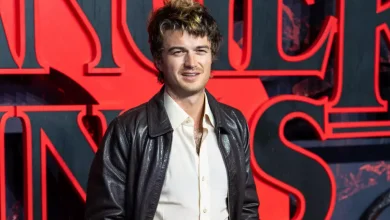‘Comedy is harder’: Rose Byrne on looking for laughs in all the wrong places

Normal text sizeLarger text sizeVery large text size
It’s the role that has brought her the biggest accolade of her career, but when Australian actor Rose Byrne first read the screenplay for If I Had Legs I’d Kick You, she had no idea how she could possibly play it.
“The script just read like fire,” says Byrne. “It was very funny and very refreshing and just hot – it was incendiary. And I was like, ‘where does one begin with this character?’ Because that’s my job, reverse-engineering back from who this woman is in this crisis. I was like, ‘Who was she before this, and why is she responding like this?’ ”
The woman in question is Linda, a psychotherapist struggling to care for her seriously sick child while her husband is away. And the crisis she’s facing is nothing short of existential. As her life spirals out of control, Linda begins to will herself out of being, hoping perhaps to be sucked into the massive hole that has mysteriously opened in the ceiling of her New York apartment, or to throw herself hopelessly and helplessly into the surf off the New Jersey coast until all her troubles are washed away forever.
It’s a picture of extreme despair, drawn from writer-director Mary Bronstein’s own experience of caring for a seriously ill child.
Byrne as Linda, a psychotherapist caring for a sick (and unseen) child in If I Had Legs I’d Kick You.Credit: AP
“My daughter and I lived together as sort of demented roommates in a small motel room for eight months, and I had a full existential crisis,” Bronstein, who has a masters in psychology as well as being an actor, writer and director, told me earlier this year when her movie opened the Melbourne International Film Festival. “I was so focused on the situation at hand, which was everything to do with her, that I felt like I was disappearing, literally.”
Linda is an avatar for Bronstein, though a fictional and heightened one. But the emotions and anguish she’s experiencing is something Byrne – who has two children with husband and fellow actor Bobby Cannavale (and a third from his first marriage) – can relate to, at least in the abstract.
“Parenting just is the biggest mirror to your own limitations and your own struggles and your capacity, or lack of capacity,” she says. “It is the most challenging role of a person’s life – and fulfilling and rewarding and life-changing, and all of those extraordinary things. But Mary is really expressing some pretty radical behaviour in this that isn’t generally seen.”
That behaviour includes Linda abandoning her child in her hotel room, where she is hooked up to a machine that drips nutrients into her wasting body, as she goes in search of alcohol and drugs. It also involves some pretty dubious choices in her role as therapist, and a desperate plea of her own therapist (played by Conan O’Brien) to “just tell me what to do”.
It’s dark stuff, but it’s also very funny. Or at least some people (me included) think so.
Byrne has seen it in the cinema a few times and, she says, “it’s like a magic trick – it plays so differently to different audiences”.
At the New York Film Festival, it played like a comedy because people “immediately understood the tone and the gallows humour of the film, and they allowed themselves to laugh very early on”.
But at the Berlin Film Festival, where she won the best actress award in February, “it played very cerebral, very quiet, very serious”. And in Toronto in September, she says, it played “like a horror film”.
There’s no question Bronstein’s take on motherhood is deliberately provocative. “She is a polarising character, absolutely,” Byrne says of Linda. “It’s the most fundamental role in the world, the mother, so this sort of behaviour is absolutely going to be challenging for people to see.”
Loading
The film doesn’t demand that viewers like Linda. But it does its best to make sure they understand her, and – to some degree at least – empathise with her.
There are a couple of key tricks Bronstein employs to that end. One is to film Byrne in extreme close-up, with the camera often just 15 centimetres or so from her face.
“I could hear the camera going ‘click-click-click’, because it was film,” says Byrne. “On the first day, I was like, ‘are you really going to get that close?’ But then it was cool. I mean, it was obviously confronting to see the film and realise, ‘oh, God, you can see everything on my face’. That’s the power of dissociation when you’re performing, you think, ‘no one’s actually gonna see it that close’. And then you see it!”
The other trick was to not show the sick daughter at all.
“If you see the child, your empathy is going to go with the child, not with Linda,” Byrne observes. “So she’s taking that choice away from the audience and forcing you to reckon with this parent, with this woman. Obviously, I will defend the character – that’s my job, to be the best lawyer I can be for the character – but I do think she kind of had to do what she did.”
Actors will often tell you that they always look for a way to empathise with the character they are playing, no matter how unlikeable or even villainous they might be. But when the character is based on a real person who just happens to be the writer and director too, well, the pressure to do that is really on.
Luckily, the pair clicked as soon as they met. “We are exactly the same age, we both have kids, she has a great sense of humour, and we hit it off,” the Australian says.
They started working together just as the Hollywood strikes began. And that meant they had plenty of time to work out how to approach the material.
Writer-director Mary Bronstein with Rose Byrne at the film’s London premiere last month.Credit: Stuart C. Wilson/Getty Images for BFI
“We had a five- or six-week period where I’d drop off my kids, she’d drop her kids, and I’d go over and we’d sit at her kitchen table three or four days a week,” Byrne says. “We started at page one, scene one, word one, and just combed through every single thing.”
They traded what Byrne calls “parenting war stories”, and at one point, Bronstein even opened up the journals she had kept at the peak of her daughter’s illness (who, now 15, is fully recovered).
“It was heartbreaking, such an intimate thing to share with me, in her handwriting, just the simple day-to-day struggle she was going through, and the pressure she was under to help her daughter,” Byrne says.
The goal through that long rehearsal process, Bronstein adds, “was to make Linda come alive as such a real person that if somebody was to walk by and hear us talk about her, they would just assume we’re gossiping about a friend. So by the time we get to set, there’s just no choice Rose could make that would be wrong because we know this woman so well.”
For my money, they succeeded brilliantly: Byrne’s performance is astonishing. And she’s ably supported by a terrific cast that includes O’Brien as Linda’s therapist, Bronstein herself as a very judgmental doctor, fellow Australian Danielle Macdonald as a young mother struggling to care for her infant, rapper A$AP Rocky as a hotel worker whose attempts to befriend Linda are more or less brutally rebuffed, and Christian Slater in a delightful cameo.
Conan O’Brien plays Linda’s therapist in the film.Credit: AP
But, I wonder, how does Sydney-born Byrne, who has become one of Hollywood’s most surprising and revered comedic actors, see the movie? Is it a comedy or is it a tragedy?
“I mean, I’m always looking for a gag, you know what I mean,” says Byrne, with just a hint of Groucho Marx in the delivery.
In terms of performance, she adds, they “come from the same place”, though she thinks “comedy is harder”.
“You have to take it more seriously,” she explains. “If the stakes aren’t high, it’s never going to be funny. We can all agree on what is sad, but what is funny is far harder to agree on.”
Ultimately, If I Had Legs I’d Kick You is, she feels, a comedy, though not in the same way as Neighbors or Bridesmaids or her beloved TV series Platonic (a third season of which she hopes will come, though there is as yet no word).
“It’s not jokes-funny,” she says, “it’s behaviourally funny.”
And was it fun to do, despite the intensity of the material and the strangeness of having a camera shoved right in your face for much of your performance?
“It was terrifying, and it was a tightrope, but it provided such a creative thrill,” she says. “My adrenaline was just through the roof. I loved it every day.”
If I Had Legs I’d Kick You is screening now.
Must-see movies, interviews and all the latest from the world of film delivered to your inbox. Sign up for our Screening Room newsletter.





